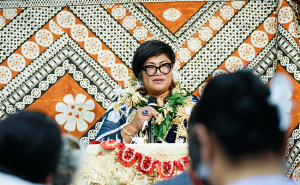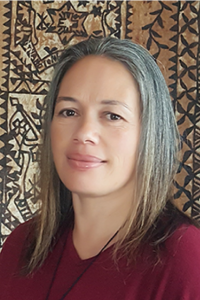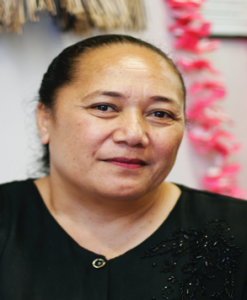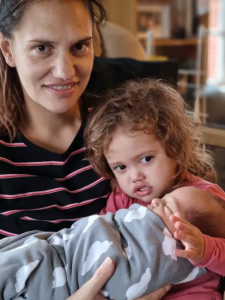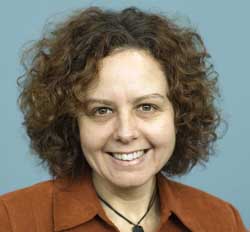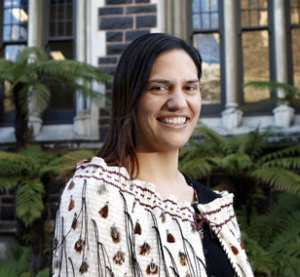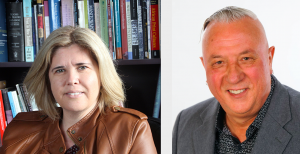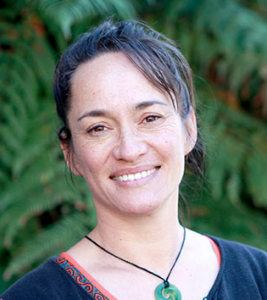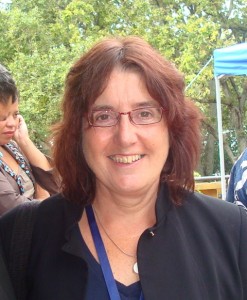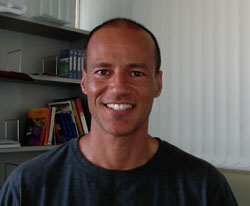Niue texts researcher signs MOU with Tāoga Niue

Last week, Dr Jess Pasisi (Mutalau, Hikutavake, Niue; Ngāti Pikiao, Tahiti) signed a Memorandum of Understanding (MOU) alongside Moira Enetama, Director of Tāoga Niue, Ministry of Social Services, of the Government of Niue. The MOU relates to Dr Pasisi’s Marsden […]
Wonderful achievement for Te Tumu PhD candidate
Te Tumu PhD candidate Wanda Ieremia-Allan is now bound to the UK on a University of Cambridge fellowship to research the historical legacy of the Samoan periodical, O Le Sulu Samoa, a newspaper that has been active for 184 years.Otago’s Bulletin Board wrote a great article on Wanda’s achievement and the background of her interest in this newspaper. Click here to read more.
Fast-Start Marsden on Niuean Texts
Fakaalofa lahi atu!
Congratulations to Dr Jess Pasisi on being awarded a FastStart Marsden grant worth $360,000, entitled “Mapping Niue texts in and beyond Aotearoa: Expanding on New Zealand Realm connections to Niue through archival texts.” Jess (Niuean (Mutalau, Hikutavake), Pākehā, Ngāti Pikiao, and Tahitian) is Te Tumu’s most recent academic hire and is based in our Pacific Islands Studies programme, and is already a promising researcher, having been awarded a Pacific Health Postdoctoral Fellowship by the Health Research Council to investigate Niuean happiness.
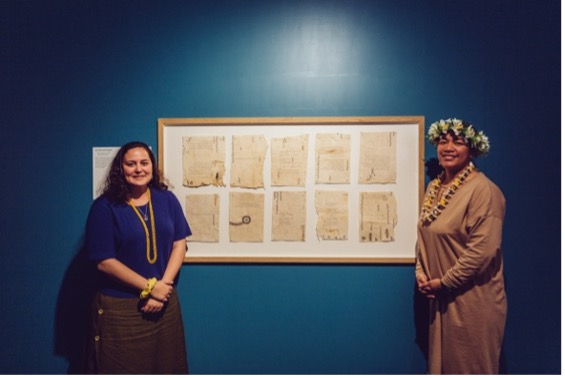
Jess Pasisi (L) and Cora-Allan Lafaiki Twiss at the Auckland Museum exhibition launch of “Archives of Emotion” in 2021, with their piece ‘Ko e Higoa Haaku ko Hiapo’. Photo courtesy of Auckland Museum.
Jess started putting the Mapping Niue texts project together while still based at the University of Waikato, with Professor Alice Te Punga Somerville as Associate Investigator. Professor Somerville has also moved, and is now at the University of British Columbia. She is well versed in literary projects, and Jess worked as a researcher with her in the “Writing the New World” project.
Jess’s Marsden project will be uncovering and analysing Niuean texts – with the meaning of “texts” interpreted quite broadly, comprising publications, manuscripts and other tāoga – with the aim of making these more available to Niuean people in Aotearoa New Zealand, Niue, and beyond. This also involves collaborating with Niuean communities, including cross-disciplinary work with tufuga (experts, practitioners), and encouraging Niuean people to engage with their local archives.
Research outputs include a book based on the project’s research, and the creation of a dataset of Niuean texts which will be invaluable to the wider Niuean community, as well as incoming researchers. Jess is planning three workshops as part of the project, one at Otago, one in Niue, and one at an international venue. Aligning with the aims of Marsden Fund to help develop future scholars, the project will also fund a Masters thesis scholarship, as well as some undergraduate summer scholarships.
We wish Jess well with her exciting new research project, and for a long productive career in academia.
Please also check out the Marsden Fund article for more details on Jess’s research.
Image information. Jess Pasisi wrote the poem for ‘Ko e Higoa Haaku ko Hiapo’ and Cora-Allan Lafaiki Twiss, a tagata Niue artist and practitioner, made it into an art piece that was purchased by the Auckland Museum. To read the poem, see images of the artwork, and more information, click here.
Te Tumu’s UORG success
Three Te Tumu staff, Pai Taani, Dr Telesia Kalavite and Associate Professor Karyn Paringatai, have been awarded University of Otago Research Grants (UORGs) that will allow them to undertake or further research projects.
The title of Paia Taani’s research project is “I ahatia taku reo Māori? Tracking intergenerational transmission of te reo Māori within whānau”. She says, “my own experiences of learning te reo Māori as a second language and raising my own children with the language sparked my interest to investigate what happened to my language. This research project will therefore investigate the intergenerational transmission of te reo Māori within my whānau.”
Paia’s aim is to is to contribute to the existing research and literature about the use of te reo Māori within the context of whānau. Her research includes analysing whānau narratives to examine the historical intergenerational transmission of te reo Māori and will highlight critical moments within these narratives to explore the factors which affected language transmission within her whānau. The key themes emerging from these accounts will inform future language pathways for her whānau, and may also be used to generate recommendations to offer other whānau who may be seeking to reclaim their language.
The University of Otago Research Grant will help fund travel to the North Island to undertake hui and kōrero with participants, and will also fund a research assistant to undertake transcription work.
Paia expects that she will publish at least two journal articles from her research project, and she will one conference presentation. Another expected output of this research project is a hui with her participants where she will disseminate her findings and discuss ways to move forward with future research and support for whānau wanting to reclaim their language.
Telesia Kalavite’s research project explores “The implications of changing cultural practices in Tongan wedding celebrations in New Zealand”, and how these changes impact on Tongan people’s lives in New Zealand. This project has national and international significance in understanding the development of Tongan culture and identity in the diaspora as well as the myriad cultural, social, economic, political and environmental impacts that are encompassed in Tongan wedding celebrations. It will identify and map out traditional cultural practices in Tongan weddings over time and space. This will provide a context in which to explore contemporary factors affecting Tongan wedding practices in Aotearoa.
Telesia sees this as a pilot study for a larger project in the future on how Tongan celebrations impact on Tongan people’s socio-cultural and economic development in Aotearoa New Zealand. She says “I am a Tongan researcher, and it is very important that to get this kind of research righ; there should be people with clear expertise and connection to it, like myself.”
Karyn Paringatai is collaborating with Marcelle Wharerau, formerly a Te Tumu student and staff member who is now an academic based at the Tauranga campus of Te Pua Wānanga ki te Ao – Faculty of Māori and Indigenous Studies, University of Waikato. Their project is titled “Te Aho Tāngaengae: Māmā, Wahine, Māori, Academic”. Socio-economic stability through intergenerational mobility is a priority of whānau Māori; ensuring that future generations have full access to a range of resources that enhances intergenerational whānau wellbeing. Income, education and occupation feature predominantly in intergenerational mobility studies as primary indicators of social and economic status. However, this focus is too narrow and neglects the importance of also embedding cultural stability and responsibility. Whilst socio-economic stability and upward mobility is a priority of Māori, equally important is the intergenerational transmission of te reo Māori and tikanga Māori.
Colonisation has had profound negative effects on all aspects of te ao Māori, including maintaining intergenerational responsibilities for protecting and enhancing the mana of whānau, hapū and iwi. In this unique research, Karyn and Marcelle aim to show how the reestablishment of this intergenerational responsibility to contribute to the decolonisation of te ao Māori must be a deliberate priority and why it is of urgency to do so.
Te Aho Tāngaengae gives voice to the narratives of wāhine Māori academics who are first in family to complete higher education/university and the mechanisms they employ in the intergenerational transmission of cultural capital. Increasing the capacity, and linguistic and cultural capabilities of Māori across generations who can tangibly contribute to improving the social, economic and political wellbeing of te ao Māori must be a priority. This research is important to reveal new insights into the methods used that have the potential to accelerate transformative change within whānau for generations to come.
Marsden Success for Dr Erica Newman
 This has been a great year for Dr Erica Newman whose research project, Journey Home: Descendants of Māori adoptees search for their tūrangawaewae, has been awarded a $300,000 Marsden Grant over three years. This is wonderful news for Te Tumu, who now have three staff undertaking Marsden-funded research.
This has been a great year for Dr Erica Newman whose research project, Journey Home: Descendants of Māori adoptees search for their tūrangawaewae, has been awarded a $300,000 Marsden Grant over three years. This is wonderful news for Te Tumu, who now have three staff undertaking Marsden-funded research.
Summary: Māori adoptees who have no knowledge of their Māori heritage pass the unknown to their descendants. Focusing on these descendants, this project will explore; how they identify with their taha Māori, avenues they have taken to connect to their taha Māori, and how they are accepted by their whānau and hapū. I will follow participants on their journey of discovery and will examine hapū membership eligibility. Oral narratives will be the primary base for this project with published and unpublished sources used to support and highlight issues the participants encounter. This will begin a new area of research that will highlight the issues of transracial adoption on identity and well-being for descendants of Māori adoptees in Aotearoa New Zealand. [Advisor: Associate Professor Angela Wanhalla.]
Erica was also one of the award winners featured by the Royal Society Te Aparangi.
For the complete list of 2020 Marsden grant awards, click here.
Fingers Crossed for Marsden Second Round
Te Pūtea Rangahau a Marsden/Marsden Fund is one of the most prestigious opportunities for externally-funded research grants, and highly competitive. The grants fund three-year research projects, as well as channel some income into the university. The Marsden Fund operates as a two-stage process. Although the quality of all the initial applications (where the research idea is pitched) tends to be very high, most applicants do not get invited to submit a full proposal. In the Humanities Panel just 26.1% got through to the second round, and in Social Sciences it was 22.6%. At the second round successfully gaining a grant then becomes a (roughly) 50/50 chance. So we can see, winning a Marsden is very hard, and getting through to the second round is worth acknowledging and celebrating.
It will now be an anxious time for our Te Tumu staff, Dr Lyn Carter and Dr Erica Newman, involved in preparing their full proposals.
Dr Lyn Carter is part of larger team led by Dr Pedersen Zari of Victoria University, with the project: Empowering Oceania Nature-based Urban Design: Knowledge sharing, Leadership and community Partnering in Climate Change Adaptation. This is a “standard” Marsden application, i.e. submitted by experienced researchers, most often as a team.
Summary: Climate change impacts settlements of Oceania, including Aotearoa, in significant ways. ‘Nature-based solutions’ (NbS) have great potential to address these impacts. Incorporating traditional knowledge into NbS will offer more culturally appropriate and long-term solutions, however links to wellbeing agendas have not been fully explored. This research investigates how well being can be strategically linked to ecologies, and how this can be harnessed to create ecologically resilient ‘Ocean cities’. Research into how the human-nature-climate nexus can be leveraged to enhance the effectiveness of NbS will make a significant contribution to the urban climate adaptation research in Aotearoa, the Pacific, and globally.
Dr Erica Newman project is a “fast-start” application, which are for early career researchers, often working by themselves. Her topic is: Journey Home: Descendants of Māori adoptees search for their tūrangawaewae.
Summary: Māori adoptees who have no knowledge of their Māori heritage pass the unknown to their descendants. Focusing on these descendants, this project will explore; how they identify with their taha Māori, avenues they have taken to connect to their taha Māori, and how they are accepted by their whānau and hapū. I will follow participants on their journey of discovery and will examine hapū membership eligibility. Oral narratives will be the primary base for this project with published and unpublished sources used to support and highlight issues the participants encounter. This will begin a new area of research that will highlight the issues of transracial adoption on identity and well-being for descendants of Māori adoptees in Aotearoa New Zealand. [Advisor: Associate Professor Angela Wanhalla.]
We all have our fingers crossed that Erica and Lyn’s projects make it through.
Te Tumu in this year’s Marsden Round
This has been a great year for research in Te Tumu. Every November Te Pūtea Rangahau a Marsden (Marsden Fund), run by the Royal Society Te Apārangi, announces its forthcoming research grants. Winning a grant is a two stage process, with applicants having to get past a preliminary round, then develop their applications for the second round; they have about a 10% chance of success in the Humanities and Social Sciences panels. There are six successful applications within the Division of Humanities, three of which have a Te Tumu connection.
Dr Karyn Paringatai‘s project “E kore au e ngaro! The enduring legacy of whakapapa” ($823,000, Social Sciences panel) looks at how the knowledge of whakapapa can impact on health, with particular reference to Māori affected by the CDH1 cancer-causing gene. Click here for more information. Professor Parry Guilford, Director of Otago’s Centre for Translational Cancer Research, is an associate investigator on the project.
Associate Professor Lachy Paterson is a principal investigator alongside Associate Professor Angela Wanhalla (History Department) on “Te Hau Kāinga: Histories and Legacies of the Māori Home Front, 1939-1945” ($746,000, Social Sciences panel), exploring the lived experiences of Māori who remained in New Zealand during the Second World War. Click here for more information. Although the project begins next year, one of our undergraduate students, Haeata Watson, has already started a project looking at Ngāti Kahungunu experiences, funded through a Ngā Pae o te Māramatanga Summer Internship.
Both Karyn and Lachy are based in Te Tumu’s Māori Studies programme, occasionally teaching into the Indigenous Development programme. Karyn also coordinates the Master of Indigenous Studies programme.
Professor Merata Kawharu, who until recently held an adjunct position within Te Tumu but is now based at the Centre for Sustainability, was also successful. Her project, “A question of identity: how connected are Māori youth to ancestral marae, and does it matter?” ($605,000, Humanities panel) will investigate the relationships that young Māori have with their marae. Click here to find out more. Merata with be working with associate investigators, Dr Stephen McTaggart (University of Auckland), former Dean of Te Tumu, Professor Paul Tapsell (now at the University of Melbourne) and Dr Krushil Watene (Massey University).
Special thanks to Marjoleine Righarts, Research and Enterprise’s Research Advisor for Humanities who helped immensely with all the applications.
Te Tumu scholar in successful Research Theme bid
Associate Professor Jenny Bryant-Tokalau of Te Tumu is one of 14 Principal Investigators in the recently awarded University Theme, Asia-Pacific Biocultural Health: Past and Present.
The theme, which is coordinated by Haille Buckley, Tuari Potiki, Tony Merriman and Sian Halcrow and has attracted academics from various Otago divisions, is funded for five years. It will investigate fundamental questions of the human past that have pressing implications for human society today in Aotearoa, the Pacific and Southeast Asia. Questions of the origins of people, non-communicable disease, and social inequality, and major subsistence and cultural change will be assessed drawing on a range of cross- and multi-disciplinary approaches mobilising research expertise in the University.
Jenny’s role in the theme is her work on adaptation to climate change and hardships and inequality in the Pacific.
Te Tumu academic wins Ngā Pae Fulbright visiting scholarship
Congratulations to Dr Matiu Rātima, one of our Māori-language kaiako, who has recently been awarded a Ngā Pae Fulbright visiting scholarship to undertake research at the Mānoa campus of the University of Hawai`i, in Oahu. Matiu will be away from 10 August 2015 to 10 January 2016 during his Research and Study Leave.
While in Hawai’i where he’ll be working with Dr Keao Nesmith of the Kawaihuelani Center for Hawaiian Language on their research project titled, “Communicative Language Teaching for Indigenous Language Revitalisation”.
Globally there are few indigenous languages that are not under threat of decline or extinction. It has been estimated that of the world’s 6,912 known languages, 95% of these are spoken by less than 6% of the population. Experts forecast that less than 10 percent of the world’s living oral languages (in the year 1992) will still be spoken by 2092. Urgent action, underpinned by good research, is vital to stop this decline.
Matiu’s research will examine four key questions.
1. How are indigenous languages being taught within universities?
2. What pedagogies are being applied?
3. What constitutes ‘best practice’ in indigenous language teaching? And;
4. How can Communicative Language Teaching help to produce speakers of indigenous languages?
The research focuses on three case studies, the teaching in universities of the Māori, Hawaiian and Tahitian languages.
Fulbright New Zealand promotes “mutual understanding between the peoples of New Zealand and the United States of America by means of educational and cultural exchange”, and offers a range of grants for New Zealand academics and graduates to research in America.
He Pūtea Rangahau – Māori Research funding opportunities
News on two upcoming Māori research funding opportunities
From Ngā Pae o te Māramatanga
We will be commissioning new research around “Optimising Maori Economic performance”. What we would like you to do is be very creative when looking at the RFP and see how you can wrap it within your own discipline. We have funding for four projects so it is competitive. However, in these times we are pleased to offer this investment and look forward to your applications.
From the Website:
“NPM seeks to invest in research projects focussing on its research priocrity ‘Optimising Māori Economic Performance’ that aligns to its research direction. The total maximum budget available per project is $150,000 (fully costed, exclusive of GST, over 12 months). Funding is available for a 1 December 2014 commencement date.
NPM is seeking applications from individuals or groups within its PRE Network interested in undertaking research within the scope of the RFP. Applications should provide a concise summary of the research project including:
Up to two pages outlining the proposed research (goals and objectives, methods, details of the significance and/or relevance of the research); Excellence, Benefits and Transformations; An outline of the relevant collaborative arrangements; A dissemination plan; Biographical sketches; and Budget details.
The applications details are short but must contain in the proposal a specific research question and methodology. Applicants should have identified a research team and the study design and methods the team propose to use. Applicants should have secured access to information (or have clearly identified the pathways for access) and demonstrated mechanisms for engagement of key stakeholders, including the express support of Māori communities or other relevant parties where required. The research outlined in the application is expected to be feasible with a 12 month time frame and with a corresponding budget.
Click here for contact details.
From Te Taura Whiri i te Reo Māori (Māori Language Commission)
He pānui tōmua tēnei e pā ana ki ngā ratonga rangahau (whakaurunga kaipupuri pānga) e hiahiatia ana e Te Taura Whiri i te Reo Māori, e He Puna Whakarauora ā, ko tāna Rārangi Take Rangahau ā-Motu te kaupapa.
Ka puta tētahi Tono Marohi ki runga i a GETS i te marama o Mahuru. Ko te tikanga, hei whakamōhiotanga tōmua tēnei tuhinga i ō mātou hiahia tērā pea ka whakatakotoria, te angawā me ngā here ā-mua hoki e whai wāhi ai ngā kaiwhakarato torohū ki te whakaaroaro mehemea ka pīrangi rātou ki te tāpae i tētahi tono.
Mā te Pānui Tōmua, tēnā e ai tō aro ki te pae ipurangi.
This is an advance notice of research services (stakeholder engagement) required by Te Taura Whiri i te Reo Māori, He Puna Whakarauora, in relation to its National Research Agenda.
A Request for Proposal will be advertised on GETS in September. This is only intended to provide some advance notice of our likely requirements, timeframe and preconditions to enable potential suppliers to consider in advance whether they wish to submit a proposal.
For the full notice please refer to the Government Electronic Tender Service website
GETS RFx Id: 3432637, Whakaurunga Kaipupuri Pānga Reo Māori, Māori Language Stakeholder Engagement

